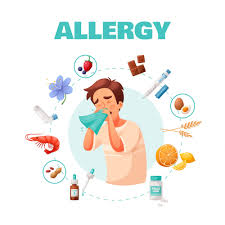
ALLERGIES
Allergy Definition
A condition in which the immune system reacts abnormally to a foreign substance.
Allergy develops when the immune system becomes hypersensitive to a food or other substance.
10 MOST COMMON TYPES AND SOLUTIONS
- Drug allergy :
An abnormal reaction of the immune system to a medication.
SOLUTION
Your physician about the drugs you’ve allergies to and your physician will prescribe the ones you’re allergies to.It’ll be recorded in your medical history that you’re allergic to the particular drug.
- Food allergies
An unpleasant or dangerous immune system reaction after a certain food is eaten.
SOLUTION
Keep yourself hydrated. “While your body is purging the allergen food from it is system, the best thing you can do is drink plenty of fluids,” Zeitlin says. Water is always a good idea, but you can also sip on low calorie sports drinks to replenish the electrolytes you’re likely losing, Zeietlin says .
- CONTACT DERMATITIS
A skin rash caused by contact with a certain substance.
SOLUTION
Consult a dermatologist if possible or observe yourself to detect what your skin is reacting too and do away with it immediately.
- Latex allergy
An allergic reaction to certain proteins found in natural rubber latex.
SOLUTION
Avoid it - Allergic asthma
Asthma triggered by exposure to the same substances that trigger allergy symptoms.
SOLUTION
Take samples or observe dust around your home, that causes allergies and do away with it .Ensure a clean environment is maintained.
- Smell Allergies
Smell allergies :An abnormal allergic response to smell of food,chemicals and other substances.
SOLUTION
Leave wherever the smell is coming from immediately you inhale it .
- Seasonal allergies
An allergic response causing itchy, watery eyes, sneezing and other similar symptoms.
SOLUTION
Stay indoors on dry, windy days.
Avoid lawn mowing, weed pulling and other gardening chores that stir up allergens.Remove clothes you’ve worn outside and shower to rinse pollen from your skin and hair.Don’t hang laundry outside pollen can stick to sheets and towels
- Animal allergy
An abnormal immune reaction to proteins in an animal’s skin cells, saliva or urine.
SOLUTION
Avoid animals you are allergic to .
9.Anaphylaxis
A severe, potentially life-threatening allergic reaction.
SOLUTION
Visit the clinic and use your drug frequently.
- Sound allergies
An allergic reaction to a particular sound of object or sound that occurs when a object is moved .
SOLUTION
Stop or leave anywhere you hear the sound you are allergic to. Don’t try to endure the sound please.
FOUR TYPES OF HYPERSENSITIVE
The four types of hypersensitivity
Type I: reaction mediated by IgE antibodies.
Type II: cytotoxic reaction mediated by IgG or IgM antibodies.
Type III: reaction mediated by immune complexes.
Type IV: delayed reaction mediated by cellular response
Symptoms of allergies
Some of the symptoms of an allergic reaction include:
Itchy(watery eyes and nose)
Sneezing.
Runny nose.
Rashes.
Hives (a rash with raised red patches)
Stomach cramps.
Vomiting.
There is currently no cure for allergies. However, there are prescription and medications that may relieve symptoms. Avoiding allergy triggers or reducing contact with them can help prevent allergic reactions. Over time, immunotherapy may reduce the severity of allergic reactions.(Unknown Triggers)It is possible that you are not entirely sure what is triggering your allergy symptoms, which is why they are not going away. Allergy triggers include pollen, molds, animal dander, and food.
How do you know you’ve allergies??
When a harmless substance such as dust, mold, or pollen is encountered by a person who is allergic to that substance, the immune system may over react by producing antibodies that “attack” the allergen. The can cause wheezing, itching, runny nose, watery or itchy eyes, and other symptoms.
Skin prick testing is one of the most common allergy tests. It involves putting a drop of liquid onto your forearm that contains a substance you may be allergic to. The skin under the drop is then gently pricked. If you’re allergic to the substance, an itchy, red bump will appear within 15 minutes .
Allergies get worse at night
Warm temperatures push pollen into the air, but cooler evening air means that pollen falls back down to cover outdoor surfaces at night. If you collect pollen (or other allergens) in your hair or clothes over the course of the day, it can cause bedtime allergy symptoms once you’re in for the night.
Know your allergies and do away with them ,that way you will live healthy.Allergies doesn’t have cure ,you can only prevent it .
✍️ Author :Adeoti Odunayo Boluwatife
Publisher:Gistcore
Leave a Reply